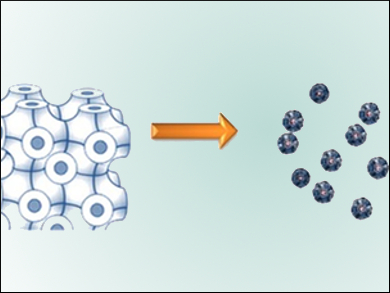While standard chemotherapy targets quickly dividing tumor cells, healthy tissue is also damaged leading to adverse side effects. For this reason it is highly desirable to load anticancer drugs like doxorubicin (DOX) into an appropriate drug-delivery system to ensure control over release rate and protect the therapeutic molecule from unwanted chemical reactions. Ideally, the drug carrier would be accumulated at the tumor site and the drug release would be triggered by an external stimulus such as a change in temperature, pH, light intensity, or magnetic field.
Lipidic cubic-phase nanoparticles known as cubosomes are used as a controlled-release system. It has high internal surface area and remarkable high drug-loading capacity. Since cubosomes selectively release their payload at low pH, they are capable of targeting sites of metastatic and primary tumors which have a lower pH than healthy tissue. A research group lead by Renata Bilewicz, University of Warsaw, Poland, showed that the anticancer effect of DOX-loaded cubosomes on the glioblastoma T98G cell line was very efficient.
The cubosome system minimizes the dosage of DOX required and the potentially harmful side effects associated with chemotherapy.
- Lipidic Cubic-Phase Nanoparticles-Cubosomes for Efficient Drug Delivery to Cancer Cells,
Ewa Nazaruk, Agnieszka Majkowska-Pilip, Renata Bilewicz,
ChemPlusChem 2017.
DOI: 10.1002/cplu.201600534 - Special Issue: Bioinspired Chemistry, Biomaterials and Bioelectrochemistry,
ChemPlusChem 2017, 82 (4).




